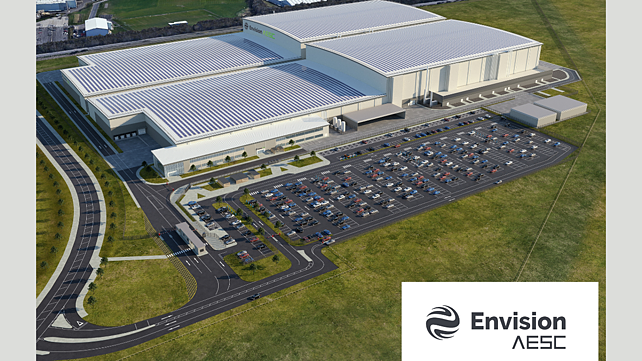
Japanese auto major Nissan today unveiled 'Nissan EV36Zero,' its flagship Electric Vehicle (EV) hub creating a world-first EV manufacturing ecosystem.
The project launched with an initial investment of £1bn by Nissan and its partners Envision AESC, a global player in world-leading battery technology, and Sunderland City Council, will supercharge the company's drive to carbon neutrality and establish a new 360-degree solution for zero-emission motoring.
The projects announced today represent 6,200 jobs at Nissan and its UK suppliers, including more than 900 new Nissan jobs and 750 new Envision AESC jobs at its new smart, low-carbon battery plant. Longer-term, the transformational project modernises and expands Nissan's EV production capability in the UK.
Nissan says that this project comprises three interconnected initiatives. Accordingly, Nissan EV36Zero will bring together EVs, renewable energy and battery production, setting a blueprint for the future of the automotive industry.
It will greatly accelerate its efforts in Europe to achieve carbon neutrality. The experience and know-how gained through the project will be shared globally, enhancing Nissan's global competitiveness.
Makoto Uchida, President & CEO, Nissan, said the project would help the company achieve carbon neutrality throughout the entire lifecycle of its products. The comprehensive approach includes the development and production of EVs, the use of onboard batteries as energy storage, and reuse for secondary purposes, he said.
UK Prime Minister Boris Johnson described Nissan's initiative as a major vote of confidence in the UK and its highly skilled workers in the North East. Building on over 30 years of history in the area, this is a pivotal moment in its EV revolution and securing its future for decades to come.
'Commitments like these exemplify our ability to create hundreds of green jobs and boost British industry, whilst also allowing people to travel in an affordable and sustainable way so we can eliminate our contributions to climate change,' the Prime Minister added.
Unveiling Nissan EV36Zero at the Sunderland Plant today, Nissan's Chief Operating Officer, Ashwani Gupta, said Nissan EV36Zero would transform the idea of what is possible for the industry and set a roadmap for the future for all.
'We reached a new frontier with the Nissan LEAF, the world's first mass-market all-electric vehicle. Now, with our partners, Nissan will pioneer the next phase of the automotive industry as we accelerate towards full electrification and carbon neutrality,' Gupta said.
Envision AESC, the battery arm of global green tech company Envision Group, will deploy integrated AIoT smart technology to monitor and optimise energy consumption, manufacturing and maintenance at its new gigafactory, enabling it to rapidly increase production and provide batteries to power up to 100,000 Nissan electric vehicles a year.
NewGen e-crossover
As part of the £1 billion announcements, Nissan will invest up to £423 million to produce a new-generation all-electric vehicle in the UK. The new crossover will be built on the Alliance CMF-EV platform, with an installed production capacity of about 100,000 units.
Batteries
Envision AESC already owns and operates Europe's first battery plant in Sunderland, established in 2012 to localise Nissan LEAF battery production. The company will invest £450 million to build the UK's first gigafactory on the International Advanced Manufacturing Park (IAMP), adjacent to the Nissan plant, powered by renewable energy and pioneering next-generation battery technology.
The plant will have an initial capacity of 9GWh, and with a future phase of £1.8bn investment, the capacity will increase to 25GWh. The site has the potential to increase up to 35GWh.
Zero-emission manufacturing
A first-of-its-kind, this project is estimated to be
The earmarked investment for the zero-emission manufacturing of £80 million also includes plans for a 1MW battery storage system using second-life Nissan EV/Envision AESC batteries. It will allow for excess energy generated during daylight hours to be captured and used when the demand is high, enabling to balance demand on the grid. Additional infrastructure projects enabling the creation of the new EV Hub will take the total initial investment above £1bn, Nissan stated.